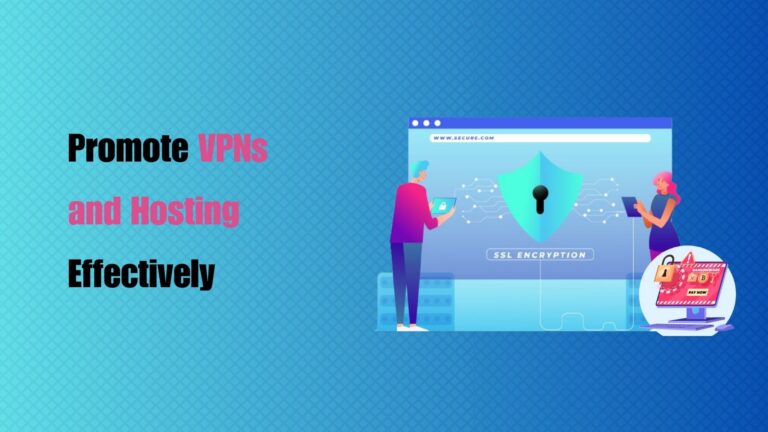Want to earn high-ticket affiliate commissions without sounding salesy? Tools like VPNs, hosting, and cybersecurity solutions are in high demand but promoting them on social media requires more than just dropping a link. How do you turn skeptical followers into loyal buyers of technical products? Keep reading, because you’re about to discover powerful strategies to position yourself as a trusted guide in a crowded space.
Once you understand how to align your content with user needs, your links won’t just get clicks they’ll convert.
Also imagine what if your content could make complex tools feel simple, even exciting? The secret lies in showing not just telling how these tools protect, power, and secure online life. Whether you’re targeting freelancers, business owners, or everyday users, your job is to make them feel like they’re making a smart, safe decision because of your guidance. Ready to learn how? Let’s dive in.
How to Promote VPNs, Hosting, and Security Tools Effectively
To promote tech tools well, understand the user intent. People buy VPNs for privacy, hosting for websites, and security tools for protection. So your content should directly show how your affiliate product solves these pain points. Focus on user concerns: Is their browsing private? Is their website fast and secure? Does their system protect them from threats? Use Reels or carousel posts to demonstrate features. For example, show how a VPN hides IPs or how hosting uptime matters. Visuals build trust.
Educate first, then sell. Create short tutorials on “How to set up your first website using [hosting]” or “3 ways this VPN protects your identity.” Add value before placing affiliate links. Value builds authority. Use comparison posts. “Why I switched from X to Y for faster hosting” or “This antivirus beats others on price and support.” Facts convert. Link to sources and be transparent.
Why These Tools Work Best with Affiliate Marketing
VPNs, hosting platforms, and security tools are perfect for affiliate marketing because of their recurring commissions and high demand. People renew them monthly or yearly, which means long-term earnings for you. They solve essential problems. Everyone online needs privacy, storage, or protection. That makes these tools evergreen your content stays relevant longer. It’s not trend-based.
Most of these tools offer strong affiliate support. Programs like NordVPN, Bluehost, and Surfshark provide banners, performance dashboards, and high payouts. This support makes promoting them easier. They work across niches bloggers, freelancers, gamers, small business owners all need security and speed. You can tailor your pitch to different audience types on Instagram, Twitter, LinkedIn, or TikTok.
Trust plays a big role. These products deal with sensitive user data or performance. A strong personal brand increases conversions because people rely on your judgment when purchasing serious tools.
Best Social Platforms for Promotion
Instagram and Stories
Instagram is ideal for visual branding. Use Stories to demo tools. Show VPN speed tests, share site-loading comparisons with and without hosting, or record your screen using the product. Add links using the “Link” sticker.
Create Highlights labeled “VPN,” “Hosting,” or “Security” for quick access. Use carousel posts to explain features or tutorials. Include CTAs like “See my full review” or “Link in bio.”
Twitter and Threads
Use Twitter for short-form educational threads. Break down technical benefits: “5 reasons I use [Tool] to secure client websites.” Add images and data when possible.
Pin your best-performing thread. Engage in replies and DMs. When followers ask for recommendations, your tweet becomes the trusted source.
Include trackable links like Bit.ly or PrettyLinks to see which content converts best.
Mistakes to Avoid While Promoting These Tools
- Promoting too many tools at once confuses your audience. Stick to one per category.
- Not showing how the product works lowers credibility. Use demos or real screenshots.
- Pushing links too soon without educating the audience reduces trust.
- Using misleading titles like “100% secure” damages your brand. Be honest.
- Ignoring mobile optimization causes poor landing page performance. Always test pages.
- Not tracking link performance. Use ClickMagick or Google Analytics.
Final Thoughts
Promoting technical tools like VPNs, hosting services, and cybersecurity software isn’t about flashy claims—it’s about helping your audience make smarter choices. When you focus on educating first and promoting second, people begin to rely on your voice.
Affiliate marketing success with these tools depends on trust, proof, and precision. Your followers are looking for safety and speed. If your content shows them exactly how to get it, they’ll reward you with clicks, conversions, and loyalty.
Frequently Asked Questions (FAQs)
What are the best VPNs for affiliate marketing?
Top VPNs like NordVPN, Surfshark, and ExpressVPN offer recurring commissions. They’re known for speed, privacy, and trustworthiness. These features make them ideal for affiliate promotion.
Can I promote hosting without a website?
Yes, many hosting programs accept social-only promotion. Instagram, Twitter, and even YouTube Shorts can work. Just focus on value-driven posts that show benefits.
How do I show product proof on social media?
Use screenshots, speed tests, or screen recordings. Walk through real results using the tool. This builds trust and shows followers your process.
Do security tools have affiliate programs?
Yes, tools like Norton, Malwarebytes, and Bitdefender do. They offer recurring or high-ticket commissions. These programs suit tech and finance audiences.
Which platform works best for promoting tech tools?
Instagram and Twitter work well for affiliate content. Use Reels or threads to share tips and demos. Both platforms support short, engaging product insights.


